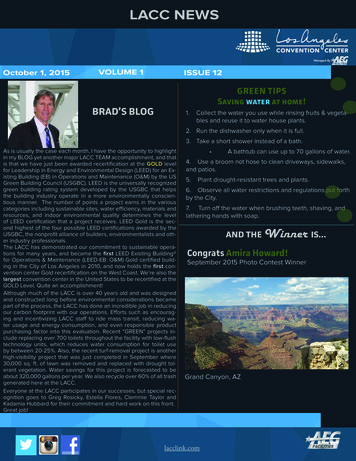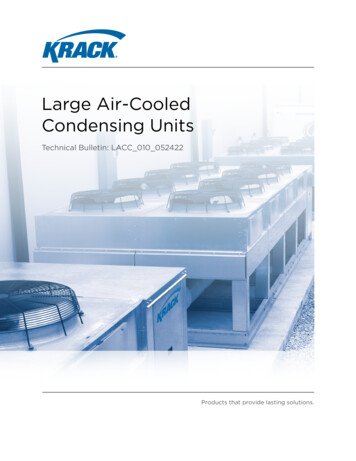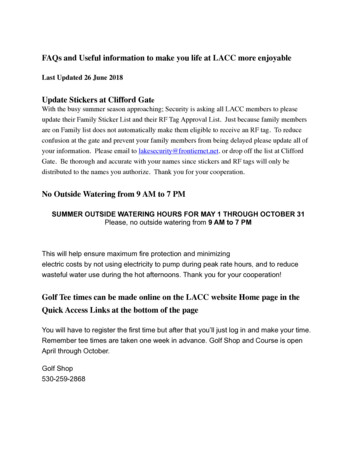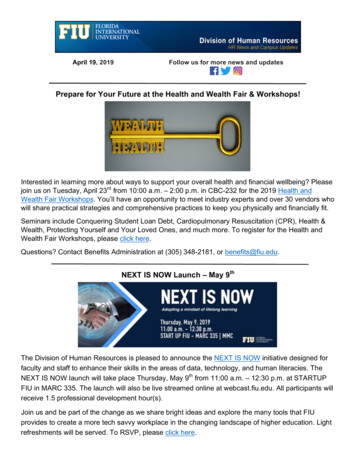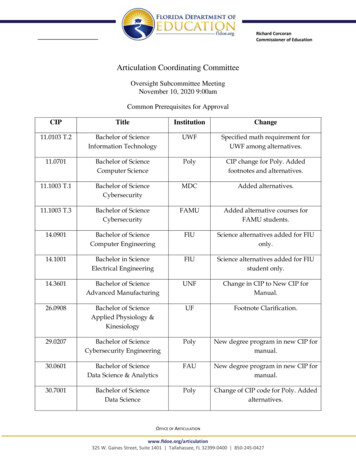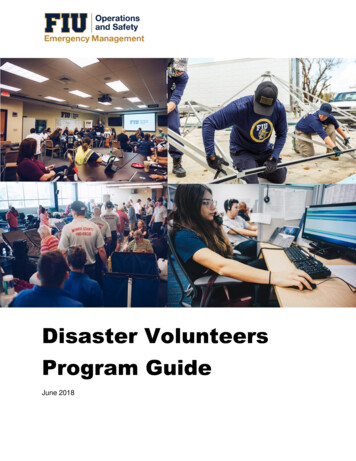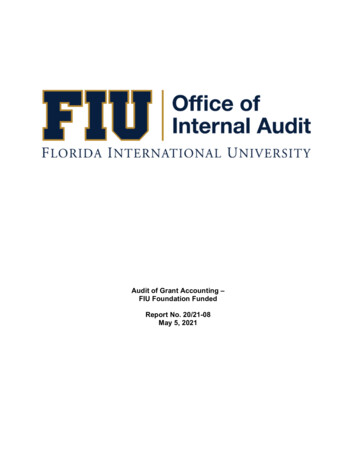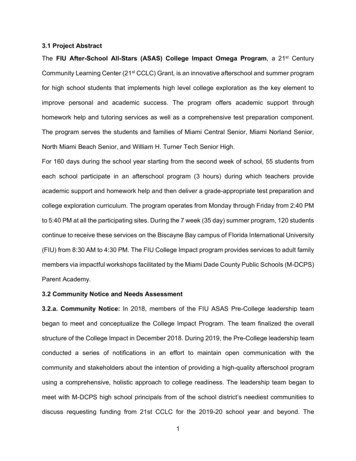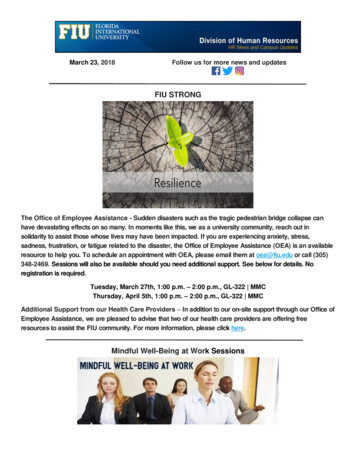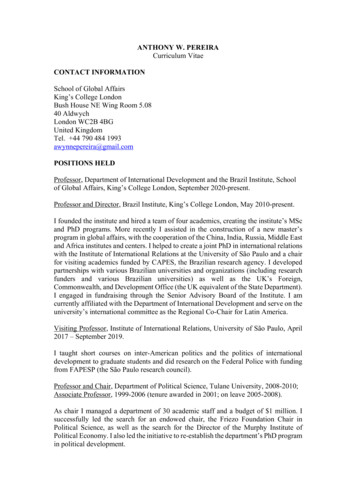
Transcription
ANTHONY W. PEREIRACurriculum VitaeCONTACT INFORMATIONSchool of Global AffairsKing’s College LondonBush House NE Wing Room 5.0840 AldwychLondon WC2B 4BGUnited KingdomTel. 44 790 484 1993awynnepereira@gmail.comPOSITIONS HELDProfessor, Department of International Development and the Brazil Institute, Schoolof Global Affairs, King’s College London, September 2020-present.Professor and Director, Brazil Institute, King’s College London, May 2010-present.I founded the institute and hired a team of four academics, creating the institute’s MScand PhD programs. More recently I assisted in the construction of a new master’sprogram in global affairs, with the cooperation of the China, India, Russia, Middle Eastand Africa institutes and centers. I helped to create a joint PhD in international relationswith the Institute of International Relations at the University of São Paulo and a chairfor visiting academics funded by CAPES, the Brazilian research agency. I developedpartnerships with various Brazilian universities and organizations (including researchfunders and various Brazilian universities) as well as the UK’s Foreign,Commonwealth, and Development Office (the UK equivalent of the State Department).I engaged in fundraising through the Senior Advisory Board of the Institute. I amcurrently affiliated with the Department of International Development and serve on theuniversity’s international committee as the Regional Co-Chair for Latin America.Visiting Professor, Institute of International Relations, University of São Paulo, April2017 – September 2019.I taught short courses on inter-American politics and the politics of internationaldevelopment to graduate students and did research on the Federal Police with fundingfrom FAPESP (the São Paulo research council).Professor and Chair, Department of Political Science, Tulane University, 2008-2010;Associate Professor, 1999-2006 (tenure awarded in 2001; on leave 2005-2008).As chair I managed a department of 30 academic staff and a budget of 1 million. Isuccessfully led the search for an endowed chair, the Friezo Foundation Chair inPolitical Science, as well as the search for the Director of the Murphy Institute ofPolitical Economy. I also led the initiative to re-establish the department’s PhD programin political development.
Senior Lecturer, School of International Development, University of East Anglia, 20062008.I taught undergraduate and graduate courses in the School.Visiting Professor, Department of Political Science, Federal University of Pernambuco,Recife, Brazil, 2005-2006.I co-taught a module on comparative politics and did research on public security reformwith grants from the Fulbright and Fulbright-Hays programs.Neil A. Allen Visiting Associate Professor of Latin American Studies, Fletcher Schoolof Law and Diplomacy, 1998-1999.I helped to reorganize the Fletcher School’s Latin American program and taught theresearch workshop for PhD students.Assistant Professor, Department of Political Science, New School University, 19911998.Visiting Assistant Professor, Harvard University Government Department, 1995.Teaching Fellow, Harvard University Government Department, 1986-91.EDUCATIONHARVARD UNIVERSITY, Ph.D. in Government, June 1991. (Major Field:Comparative Politics, with a concentration in Latin America).Dissertation: "Regime Change Without Democratization: Sugar Workers'Unions in Pernambuco, Northeast Brazil, 1961-89".Dissertation Committee: J. Domínguez (chair), F. Hagopian, R. Fishman.HARVARD UNIVERSITY, M.A. in Government, June 1986. (Major Field:Comparative Politics/Latin America; Minor Field: International Political Economy).SUSSEX UNIVERSITY, B.A. (First Class Honours) in Politics and African and AsianStudies, 1982.AWARDSMember of the British Empire (MBE), for services to UK/Brazil relations, 2018.Order of Rio Branco, Brazilian Foreign Ministry, 2017.Friend of the Brazilian Navy, 2016.Latin Americanist Graduate Organization Outstanding Faculty Member ServiceAward, Stone Center, Tulane University, 2005.Edward M. Chase Dissertation Prize, Harvard University, 1991.2
PUBLICATIONSBooksModern Brazil: A Very Short Introduction (Oxford: Oxford University Press, 2020).(with Jeffrey Garmany) Understanding Contemporary Brazil (London: Routledge,2018).Ditadura e Repressão [Dictatorship and Repression] (São Paulo: Paz e Terra, 2010).This is a Portuguese translation of the book below, with a new introduction and prefaceby Paulo Sergio Pinheiro.Political (In)justice: Authoritarianism and the Rule of Law in Brazil, Chile andArgentina (Pittsburgh: University of Pittsburgh Press, 2005).The End of the Peasantry: The Emergence of the Rural Labor Movement in NortheastBrazil, 1961-1988 (Pittsburgh: University of Pittsburgh Press, 1997).Edited volumesLauro Mattei and Anthony Pereira, eds. The Brazilian Economy Today: Towards aNew Socio-Economic Model? (London: Palgrave Macmillan, 2015).Diane Davis and Anthony Pereira, eds. Irregular Armed Forces and their Role inPolitics and State Formation (Cambridge: Cambridge University Press, 2003). [Thepaperback version of this book was published in 2008.]Articles in refereed journals“Lula’s Leadership and the Limits of the Politics of Cunning” in a special section onJohn French’s Lula and his Politics of Cunning (Chapel Hill: UNC Press, 2020) in LatinAmerican Politics and Society, forthcoming.“Samuel Huntington, Brazilian Decompression’, and Democracy” in Journal of LatinAmerican Studies, Volume 53, Number 2, May 2021, pp. 349-371.“Paper cemeteries: informal barriers to public security reform in Brazil” in RevistaBrasileira de Ciências Políciais [Brazilian Journal of Police Sciences] Volume 10,Number 1, January-June 2019, pp. 55-98.“The US Role in the 1964 Coup in Brazil: A Reassessment” in Bulletin of LatinAmerican Research, Volume 37, Issue 1, January 2018, pp. 5-17.“Nothing Succeeds Like Failure? Honduras and the Defense of Democracy inBrazilian Foreign Policy” in Rising Powers Quarterly, Volume 2, Issue 2, May 2017,pp. 83-103. This is part of a special issue on Brazil for which I also wrote anintroduction, “Brazil: Geopolitical Challenges in a Multipolar World”, pp. 7-13.3
(with Louse Tillin) “Federalism, Multilevel Elections and Social Policy in Brazil andIndia”, in Commonwealth and Comparative Politics, Volume 55, Issue 3, 2017, pp.328-352.“Is the Brazilian State Patrimonial?” in Latin American Perspectives, Volume 43,Number 2, March 2016, pp. 135-152.“Bolsa Família and Democracy in Brazil” in Third World Quarterly, Volume 36,Number 9, September 2015, pp. 1682-1699.“Politics vs. Policy: Is Police Politicization a Threat to Democracy in Brazil?” inTeoria e Pesquisa: Revista de Ciência Política [Theory and Research: Journal ofPolitical Science], Volume 23, Number 1, January-June 2014, pp. 6-28.“Continuity is Not Lack of Change” (part of a symposium, “Brazil Under PresidentDilma Rousseff: A Preliminary Assessment”) in Critical Sociology, Volume 38,Number 6, 2012, pp. 777-787.“Brazilian Studies Then and Now” in Brasiliana – Journal for Brazilian Studies,Volume 1, Number 1, 2012, pp. 3-21.“Reforma Policial y Derechos Humanos en Brasil: la Dimensión Internacional” [PoliceReform and Human Rights in Brazil: the International Dimension] in Araucaria:Revista Iberoamericana de Filosofia, Política y Humanidades, Ano 10, No. 20, 2008,pp. 155-174.(with Ana Margheritis) “The Neoliberal Turn in Latin America: The Cycle of Ideasand the Search for an Alternative” in Latin American Perspectives, Issue 154, Volume34, Number 3, May 2007, pp. 25-48.(with Jorge Zaverucha) “The Neglected Step-Child: Military Justice and DemocraticTransition in Chile” in Social Justice, Volume 32, Number 2, 2005, pp. 115-131.“The Dialectics of the Brazilian Military Regime’s Political Trials” in Luso-BrazilianReview, Volume 41, Number 2, 2005, pp. 162-183.“Explaining Judicial Reform Outcomes in New Democracies: The Importance ofAuthoritarian Legalism in Argentina, Brazil, and Chile” in Human Rights Review,Volume 4, Number 3, April-June 2004, pp. 3-16.“Brazil’s Agrarian Reform: Democratic Innovation or Oligarchic Exclusion Redux?”in Latin American Politics and Society, Volume 45, Number 2, summer 2003, pp. 4165. [An updated version of this article is reprinted in William C. Smith, ed. LatinAmerican Democratic Transformations: Institutions, Actors, and Processes(Cambridge, MA and Oxford, UK: Wiley-Blackwell, 2009), pp. 251-270.]“Political Justice Under Authoritarian Regimes in Argentina, Brazil, and Chile” inHuman Rights Review, Volume 4, Number 2, spring 2003, pp. 27-47.4
“Military Justice Before and After September 11” in Constellations, Volume 9, Number4, December 2002, pp. 477-491.“ Virtual Legality’: Authoritarian Legacies and the Reform of Military Justice in Brazil,the Southern Cone, and Mexico” in Comparative Political Studies, Volume 34, Number5, June 2001, pp. 555-574.(with Diane Davis) "New Patterns of Militarized Violence and Coercion in theAmericas", introductions to a double issue of Latin American Perspectives, Issues 111112, Volume 27, Numbers 2-3, entitled "Violence, Coercion and Rights in theAmericas", March and June 2000, pp. 3-17 and pp. 3-7." Persecution and Farce': The Origins and Transformation of Brazil's Political Trials"in Latin American Research Review, Volume 33, Number 1, 1998, pp. 43-66."Working for Democracy: Brazil’s Organized Working Class in ComparativePerspective" in International Labor and Working-Class History, Number 49, Spring1996, pp. 93-115. [Reprinted as “Brazilian Workers and Democracy” in Vincent C.Peloso, ed. Work, Protest, and Identity in Twentieth-Century Latin America(Wilmington: Scholarly Resources Inc., Jaguar Books on Latin America Number 26,2003), pp. 277-300.](with Cliff Welch), introduction to an issue of Latin American Perspectives (co-editedby Anthony Pereira and Cliff Welch) entitled "Labor and the Free Market in theAmericas", Issue 84, Volume 22, Number 1, Winter 1995, pp. 3-9."The Neglected Tragedy: The Return to War in Angola, 1992-93", in the Journal ofModern African Studies, Volume 32, Number 1, March 1994, pp. 1-28."Economic Development, Democracy, and Civil Society in the Third World: theNortheastern Brazilian Case" in Third World Quarterly, Volume 14, Number 2,November 1993, pp. 365-380."Agrarian Reform and the Rural Workers' Unions of the Pernambuco Sugar Zone,Brazil 1985-1988" in Journal of Developing Areas, No. 26, Jan., 1992, pp. 169-192."Profeta no Exílio: O Retorno do Mito de Francisco Julião" [Prophet in Exile: TheReturn of the Myth of Francisco Julião] in Cadernos de Estudos Sociais (Recife, Brazil),Volume 17, Number 1, January/June, 1991, pp. 101-119.Chapters in books“The Police Ombudsman in Brazil as a Potential Mechanism to Reduce Violence” inPablo Policzer, ed. The Politics of Violence in Latin America (Calgary: University ofCalgary Press, 2019), pp. 143-170.(with Juliana T. de S. Martins) “The Politics of Human Rights” in Barry Ames, ed.Routledge Handbook of Brazilian Politics (New York: Routledge 2019), pp. 503-518.5
“Le rôle des États-Unis dans le coup d'État 1964 au Brésil: une revaluation” in JamesGreen and Monica Schpun, eds. Le Dictature Brasilienne et son Legs (Paris: LePoisson Volant, 2018).“Brazil’s Truth Commission: Progress or Perdition?” in Peter Kingstone and TimothyPower, eds. Democratic Brazil Divided (South Bend, IN: University of Notre DamePress, 2017), pp. 152-171.“Brazil’s Truth Commission: Opportunities and Risks” in Flavia Piovesan and InêsSoares, eds. Direitos Humanos Atual [Contemporary Human Rights] (São Paulo:Elsevier, 2014), pp. 518-526.“Human Rights and Military Abuses” in P. Kingstone and D. Yashar, eds. RoutledgeHandbook of Latin American Politics (New York: Routledge, 2012), pp. 114-130.“Rural Social Movements in Nicaragua”; “Rejoinder to Jeffrey Gould”; and “Responseto John Hammond” in Jeff Goodwin and James M. Jasper, eds. Contention in Context:Political Opportunities and the Emergence of Protest (Stanford: Stanford UniversityPress, 2012), pp. 59-73; 78-82; 127-129.“Military Rule” in Bertrand Badie, Dirk Berg-Schlosser, and Leonardo Morlino, eds.,International Encyclopedia of Political Science (Beverly Hills: Sage Publications,2011), pp. 1573-1578.“Brazil: Struggle for Human Rights” in D. P. Forsythe, editor-in-chief, Encyclopediaof Human Rights (Oxford University Press, 2009), volume 1, pp. 187-197.“Brazil's Agrarian Reform: Democratic Innovation or Oligarchic Exclusion Redux?”in William C. Smith, ed. Latin American Democratic Transformations: Institutions,Actors, and Processes (Cambridge, MA: Wiley-Blackwell, 2009), pp. 251-270.“Judicial Systems and Political Repression in Argentina, Brazil and Chile” in CecíliaMacDowell Santos, Edson Luis de Almeida Teles, and Janaína de Almeida Teles, eds.Desarquivando a Ditadura: Memória e Justiça no Brasil [Uncovering the Dictatorship:Memory and Justice in Brazil] (São Paulo: Hucitec, 2009), volume 1, pp. 203-224.“Of Judges and Generals: Security Courts Under Authoritarian Regimes in Argentina,Brazil and Chile” in Tom Ginsburg and Tamir Moustafa, eds. Rule by Law: The Politicsof Courts in Authoritarian Regimes (Cambridge: C. U. Press, 2008), pp. 23-57.“Public Security, Private Interests and Police Reform in Brazil” in Peter Kingstoneand Timothy Power, eds. Democratic Brazil Revisited (Pittsburgh: University ofPittsburgh Press, 2008), pp. 185-208.“Democracy, Citizenship, and Police Procedures in New Orleans: The Importance ofthe Local Context for Defining Rights” in Stacey McGoldrick and Andrea McArdle,eds. Uniform Behavior: Police Localism and National Politics (New York: PalgraveMacmillan, 2006), pp. 127-153. [Translated and reproduced in Jorge Zaverucha,Adriano Oliveira, and Armando Nascimento, eds. (In)Segurança Pública e a OrdemSocial [Public Insecurity and the Social Order] (Recife: Editora UFPE, 2007).6
“O Papel dos Advogados de Defesa na Justiça Militar Brasileira, 1964-1979:Redefinindo o Crime Político” [The Role of Defence Lawyers in Brazilian MilitaryJustice, 1964-1979: Redefining Political Crime] in João Roberto Martins Filho, ed. OGolpe de 1964 e o Regime Militar: Novas Perspectivas [The 1964 Coup and theMilitary Regime: New Perspectives] (São Carlos: EdUFSCar, 2006), pp. 119-128.“Agrarian Reform” in Mauricio Font and Anthony Spanakos, eds. Reforming Brazil(Lanham MD: Lexington Books, 2004), pp. 93-114.(with Mark Ungar) “The Persistence of the Mano Duro’: Authoritarian Legacies andPolicing in Brazil and the Southern Cone” in Paola Cesarini and Katherine Hite, eds.Authoritarian Legacies in Southern Europe and Latin America (South Bend, IN:University of Notre Dame Press, 2004), pp. 263-304.“Armed Forces, Coercive Monopolies, and Changing Patterns of State Formation andViolence” in Diane Davis and Anthony Pereira, eds. Irregular Armed Forces and theirRole in Politics and State Formation (Cambridge University Press, 2003), pp. 387-407.(with Jorge Zaverucha) “The Rule of Law and the Federal Military Justice System inBrazil” in Gerhard Kuemmel, ed., Proceedings of the Interim Conference 2000 of theInternational Sociological Association [SOWI Forum International Volume 23](Strausbourg: SOWI, 2001), pp. 479-528."An Ugly Democracy?: State Violence and the Rule of Law in Post-AuthoritarianBrazil" in Peter Kingstone and Timothy Power eds., Democratic Brazil (University ofPittsburgh Press, 2000), pp. 217-235."O Monstro Algemado?: Violência do Estado e Repressão Legal no Brasil, 1964-97"[The Shackled Monster? State Violence and Legal Repression in Brazil, 1964-97] inJorge Zaverucha ed., Democracia e Instituições Políticas Brasileiras no Final do SéculoVinte [Democracy and Brazilian Political Institutions at the End of the TwentiethCentury] (Recife, Brazil: Bagaço, 1998), pp. 13-61."The Crisis of Developmentalism and the Rural Labor Movement in Northeast Brazil",in Douglas Chalmers, Carlos Vilas, Katherine Hite, Scott Martin, Kerianne Piester, andMonique Segarra eds, The New Politics of Inequality in Latin America: RethinkingParticipation and Representation (Oxford U. Press, 1997), pp. 95-114."The Effects of Agricultural Modernization", in Ünner Kirdar and Leonard Silk, eds,People: From Impoverishment to Empowerment (New York University Press/UNDP,1995), pp. 26-40.Prefaces to BooksLeslie Bethell, Brazil: Essays on History and Politics (London: Institute of LatinAmerican Studies, School of Advanced Study, University of London, 2018), pp. v-vii.Ulisses Terto Neto, Protecting Human Rights Defenders in Latin America: A Legaland Socio-Political Analysis of Brazil. London: Palgrave Macmillan, 2018, pp. ix-xii.7
Sara de Sousa Epitácio and Roberta Carnelos Resende, eds. Política no Piauí: Contextoshistóricos, eleições, e partidos politicos [Politics in Piauí: Historical contexts, elections,and political parties] (Porto Alegre: Editora da UFRGS, 2015), pp. 11-14.“Parathënie për botimin shqip” (Preface) to Boris Fausto, Historie shkurtër e Brazilit[Albanian translation of A Concise History of Brazil] (Tirana: Albanian Institute forInternational Studies, 2012), pp. 13-18.Articles in scholarly periodicals and working paper series“Brazil” in D.S. Lewis and Wendy Slater, eds. The 2021 Annual Register: WorldEvents (Ann Arbor, MI: ProQuest, pp. 157-160); and in The 2020 Annual Register:World Events (Ann Arbor, MI: ProQuest); The 2019 Annual Register: World Events(Ann Arbor, MI: ProQuest, pp. 146-149); The 2018 Annual Register: World Events(pp. 146-149); The 2017 Annual Register: World Events (pp. 157-159); The 2016Annual Register: World Events (pp. 149-152); The 2015 Annual Register: WorldEvents (pp. 148-150); The 2014 Annual Register: World Events (pp. 145-148); andThe 2013 Annual Register: World Events (pp. 148-151).“A Tradição da Legalidade Autoritária no Brasil” [The Tradition of AuthoritarianLegality in Brazil”] in José Geraldo de Souza Santos et al. (eds.), Introdução Crítica àJustiça de Transição [A Critical Introduction to Transitional Justice] in O DireitoAchado na Rua [Law Found in the Street] Volume 7 (Brasília: UnB Editora, 2015).“O Declínio das Ligas Camponesas e a Ascenção dos Sindicatos: as Organizações deTrabalhadores Rurais em Pernambuco na Segunda República, 1955-1963” [TheDecline of the Peasant Leagues and the Rise of the Trade Unions: Pernambuco’sRural Labor Organizations in the Second Republic, 1955-1963] in Clio: Revista dePesquisa Histórica (Recife: Department of History, Federal University ofPernambuco), Number 26-2, 2008, pp. 245-272. (Dated 2008 but published in 2009.)“Brazil: Dividing the Spoils” in The World Today (Royal Institute of InternationalAffairs), Volume 62, Number 10, October 2006, pp. 20-21.(with Ana Margheritis) “A América Latina e o Fim do Consenso de Washington’”[Latin America and the End of the Washington Consensus’] in Relações Internacionais[International Relations], (Lisbon), Number 4, December 2004, pp. 89-101.(with Timothy Power) “Lula lá: Implications of the 2002 elections in Brazil” in LASAForum (the bulletin of the Latin American Studies Association), Volume XXXIII,Number 4, Winter 2003, pp. 8-10 and 27-28.“Democracies: Emerging or Submerging?” in Dissent, Volume 48, Winter 2001, pp.17-23. Reprinted in Lettera Internazionale, Italian edition and Robert J. Griffiths, ed.Annual Editions: Developing World 02/03 (Guildford, CT: McGraw-Hill/Dushkin,2002), pp. 122-126, and in Robert J. Griffiths, ed. Annual Editions: Developing World03/04 (Guildford, CT: McGraw-Hill/Dushkin, 2004), pp. 120-124.8
Virtual Legality: The Use and Reform of Military Justice in Brazil, the SouthernCone, and Mexico, David Rockefeller Center for Latin American Studies WorkingPaper Number 99/00-2.“God, the Devil, and Development in Northeast Brazil” in Praxis, Volume XV, 1999,pp. 112-136.(with Sanjay Reddy) The Role and Reform of the State (New York: U.N.Development Programme/Bureau for Development Policy/Office of DevelopmentStudies Working Paper No 8, August 1998).Law Under Siege: The Origins and Transformation of Brazil’s Political Trials, DavidRockefeller Center for Latin American Studies Working Paper Number 96/97-7.“Latin America in the Era of Hot Money’” in Dissent, Volume 43, Number 1, Winter1996, pp. 47-51."Angola's 1992 Elections: A Personal View" in Camões Center Quarterly, Volume 5,Numbers 1 and 2, Winter 1994, pp. 1-8.“The Foreign Aid Disaster” in The New School Commentator, Volume Five, Number1, October-November 1993, pp. 1-4.“Peace in the Third World? The Case of Angola” in Dissent, Volume 40, Number 3,Summer 1993, pp. 291-294."A Transformação de Cuba" [The Transformation of Cuba] in Cadernos de CiênciasSociais, Belo Horizonte, Brazil, Volume 2, Number 2, October, 1992, pp. 51-53.“Brazil: Fire in the Forest” in Hemisphere, Volume 1, Number 3, Summer 1989, pp.3-6.Selected recent articles in magazines, newspapers and web sites“Até 2022 é tempo demais” [2022 is too far away] in Revista Problemas Brasileiros,Year 58, Number 463, April-May 2021 pp. 20-21.(with Matthew Flinders) “Donald Trump gets coronavirus: what catching COVID-19meant for Boris Johnson and Jair Bolsonaro” in The Conversation 2 October 2020.“Brazil’s Jair Bolsonaro has coronavirus – what it could mean for him politically” inThe Conversation 8 July 2020.(with Jeff Garmany) “A Year after Jair Bolsonaro’s election, why he’s not solely toblame for Brazil’s toxic politics” in The Conversation 28 October 2019.“Amazon fires: Jair Bolsonaro faces mounting political backlash in Brazil – evenfrom his allies” in The Conversation 29 August 2019.9
Interview with Paulo Beraldo, “Discurso liberal é obscurecido pelo conservador” in OEstado de São Paulo, 8 April 2019, p. A6.“Jair Bolsonaro can be stopped from trashing the Amazon – here’s how” in TheConversation 4 January 2019 republished in the Independent 7 January 2019.“Will Brazil’s Democracy Survive the 2018 Election?” in Commentary ISPI (Institutoper gli Studi di Politica Internazionale), 2 October 2018, azil’s democracy is on the ropes – and now a dreaded election begins” in TheConversation, 31 August 2018.“Lula Convicted: End of an Era?” in AulaBlog [Center for Latin American and LatinoStudies, American University, Washington DC, 17 July 2017.“Brazil’s President Faces Criminal Charges and 2% Approval Rating – But ClingsOn” in The Conversation, 30 June 2017.“Brazil Shoots for Olympian Heights at a Time of Political Lows” in TheConversation, 1 August 2016.“Who Stands to Gain from Dilma Rousseff’s Impeachment?” in Prospect, 19 April2016.“What’s Next for Brazil and President Dilma Rousseff” in Fortune, 17 April 2016.“Não em Nosso Nome” [Not in Our Name] in El País (Americas edition) 10 April2016.“Lula charged: Brazil seems ungovernable, but it’s more robust than it looks” in TheConversation, 8 March 2016.“A Crise Vista de Fora: Brasilianistas fala à Folha sobre as reflexes da atual crisepolítica e econômica no país” [The crisis seen from abroad: Brazilianists talk to theFolha about the reactions to the current political and economic crises in the country”](with Kenneth Maxwell and Barbara Weinstein) in Folha de São Paulo, 10 Jan. 2016.“Recessão não vai tirar importância do Brasil, afirma cientista político” [Therecession will not diminish the importance of Brazil, says political scientist] in Folhade São Paulo, 10 January 2016.“How the massive Petrobras corruption scandal is upending Brazilian politics” in TheConversation, 7 July 2015.Book reviewsNatalia Viana, Dano Colateral: A intervenção dos militares na segurança pública inReVista: Harvard Review of Latin America (the magazine of the David RockefellerCenter for Latin American Studies, Harvard University, forthcoming).10
Perry Anderson, Brazil Apart 1964-2019 in The Political Quarterly, Volume 91, Issue3, July-September 2020, pp. 673-675.Lee Alston, Marcus Melo, Bernardo Mueller, and Carlos Pereira, Brazil in Transitionin Perspectives on Politics, Volume 16, Number 1, March 2018, pp. 269-271.Ben Ross Schneider, ed., New Order and Progress: Development and Democracy inBrazil, in Journal of Latin American Studies, Volume 49, Number 3, August 2017, pp.659-661.Jeffrey Needell, ed., Emergent Brazil: Key Perspectives on a New Global Power, inLuso-Brazilian Review, Volume 54, Number 2, Winter 2017, pp. E1-E3.Samuel Cohn, Employment and Development under Globalization: State and Economyin Brazil, in Bulletin of Latin American Research, Vol. 34, No. 2, Jan. 2015, pp. 16-18.Mauricio A. Font and Laura Randall eds., The Brazilian State: Debate and Agenda inJournal of Latin American Studies, Volume 45, Issue 1, February 2013, pp. 175-176.Leonardo Avritzer, Participatory Institutions in Democratic Brazil in Luso-BrazilianReview, Volume 48, Number 1, June 2011, pp. 159-161.R.S. Rose, The Unpast: Elite Violence and Social Control in Brazil, 1954-2000 in LusoBrazilian Review, Volume 43, Number 2, 2006, pp. 169-170.Guillermo O’Donnell, Jorge V. Cullel, and Osvaldo Iazzetta, eds., The Quality ofDemocracy: Theory and Applications in Americas, Volume 62, Number 2, October2005, pp. 296-297.Shawn C. Smallman, Fear and Memory in The Brazilian Army and Society, 1889-1954,in Left History, Volume 9, Number 1, Fall/Winter 2003, pp. 179-182.Kirk S. Bowman, Militarization, Democracy and Development: The Perils ofPraetorianism in Latin America in Perspectives on Politics, Volume 1, Number 4,December 2003, pp. 802-803.Lincoln Gordon, Brazil’s Second Chance: En Route toward the First World inPolitical Science Quarterly, Volume 117, Number 4, Winter 2002-03, pp. 714-716.Marco F. Guillén, The Limits of Convergence: Globalization and OrganizationalChange in Argentina, South Korea, and Spain in Political Science Quarterly, Volume117, Number 3, Fall 2002, pp. 522-523.Patricia Verdugo, Chile, Pinochet, and the Caravan of Death, in Latin AmericanPolitics and Society, Volume 44, Number 2, Summer 2002, pp. 157-162.Kees Koonings and Dirk Kruijt, eds. Societies of Fear: The Legacy of Civil War,Violence, and Terror in Latin America in The Journal of Third World Studies, VolumeXVIII, Number 2, Fall 2001, pp. 316-318.11
Joe Foweraker and Todd Landman, Citizenship Rights and Social Movements: AComparative and Statistical Analysis in Mobilization, Volume 4, Number 2, Fall 1999,pp. 260-261.Kurt Weyland, Democracy Without Equity: Failures of Reform in Brazil in Journal ofInteramerican Studies and World Affairs, Volume 40 Number 2, 1998.Carlos Nino, Radical Evil on Trial in Americas, March 1998, Volume 55, Number 1.Paul Buchanan, State, Labor, Capital: Democratizing Class Relations in the SouthernCone in Journal of Latin American Studies, March 1997.Kurt von Mettenheim, The Brazilian Voter: Mass Politics in Democratic Transition,1974-1986 in American Political Science Review, September 1996.Shawn H. McCormick, The Angolan Economy: Prospects for Growth in a PostwarEnvironment in Journal of Developing Societies, December 1995.Joseph Collins and John Lear, Chile's Free-Market Miracle: A Second Look in NACLAReport on the Americas, December 1995.Leigh Payne, Brazilian Industrialists and Democratic Change in Journal of DevelopingAreas in Journal of Developing Areas, Volume 29, Number 1, October 1994.Jeffrey Frieden, Debt, Development, and Democracy: Modern Political Economy andLatin America, 1965-1985 in The Journal of Politics, November 1993.Todd Diacon, The Contestado Rebellion: Millenarian Vision, Capitalist Reality inCanadian Journal of Latin American and Caribbean Studies, Volume 17, Issue 34,1992, pp. 132-134.Abraham F. Lowenthal (ed.), Exporting Democracy: The United States and LatinAmerica in Political Science Quarterly, Winter 1992.Jean de Léry, History of a Voyage to the Land of Brazil, in Canadian Journal of LatinAmerican and Caribbean Studies, Volume 16, Issue 32, 1991, pp. 119-122.Ronald Chilcote, Power and the Ruling Classes in Northeast Brazil: Juazeiro andPetrolina in Transition in South Eastern Latin Americanist, September 1991, VolumeXXXV, No. 2.Youssef Cohen, The Manipulation of Consent: The State and Working-ClassConsciousness in Brazil and Charles Davis, Working-Class Mobilization and Control:Venezuela and Mexico in American Political Science Review, Vol. 84, No.4, 12/1990.William Blum, The CIA: A Forgotten History; John Prados, Presidents’ Secret Wars;and John Ranelagh, The Agency: The Rise and Decline of the CIA, in "The CIA's NotSo-Secret Wars" in Fletcher Forum, a journal of the Fletcher School of Law andDiplomacy, Tufts University, Winter 1988.12
Wayne Smith, The Closest of Enemies in "The Disillusionment of a Diplomat" in theHarvard International Review, January 1988.SELECTED PROFESSIONAL EXPERIENCESConsultingAssociate Fellow, Canning House, a think-tank devoted to the understanding of LatinAmerica and Iberia, 2019-present.Occasional Advisor, Gatehouse Advisory Partners, 2018-present.Contributor and reviewer, Murderous Histories: The Case of Claudia, SmithsonianChannel documentary about a murder in Rio de Janeiro in 1977, 2020.Consultant, Brazil’s National Truth Commission, 2014. (I contributed to thecommission a paper on the role of the judiciary in gross human rights violations duringthe dictatorship of 1964-85.)Consultant involved in seminars on Brazil and Latin America for the UK Foreign,Commonwealth and Development Office and the Home Office, 2012-present.Consultant, Amnesty International, 2011. (I wrote a report on human rights policy inBrazil and the potential benefits to AI of establishing an office in the country.)Participant, conference on civil-military relations in Latin America organized by theUS Department of State, 2001.Consultant, United Nations Development Programme, 1994-5. (I co-wrote, with theeconomist Sanjay Reddy, a report on the role and reform of the state in development.)Polling station manager for the UN Transitional Authority in Cambodia, 1993.Election observer for the International Foundation for Electoral Systems, Angol
School of Global Affairs King's College London Bush House NE Wing Room 5.08 40 Aldwych London WC2B 4BG United Kingdom Tel. 44 790 484 1993 awynnepereira@gmail.com POSITIONS HELD Professor, Department of International Development and the Brazil Institute, School of Global Affairs, King's College London, September 2020-present.
